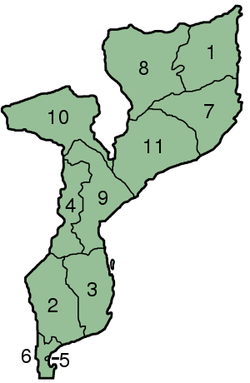Mozambique political system
The political system of Mozambique has been democratized since the end of the Mozambican civil war , but shaped by the experience of Portuguese colonial rule and the connection to the Eastern Bloc during the times of the People's Republic of Mozambique . The regular elections since the 1990s are classified as largely free by independent observers. However, the FRELIMO party, which has been ruling since independence, dominates the political landscape almost unchallenged and uses its opportunities as a permanent governing party to its advantage even in elections.
Mozambique is a nominally presidential representative and democratic republic. The President of Mozambique is head of state and head of government within a multi-party system .
In the country report Freedom in the World 2017 by the US non-governmental organization Freedom House , the country's political system is rated as “partially free”. Mozambique received a grade of 4 in the category “political rights”, and the country also received a grade of 4 for respecting civil rights (grade 1 was the best and 7 the worst). Mozambique is not yet one of the electoral democracies due to the widespread political corruption.
executive
The President of the Republic acts as head of state, head of government, commander in chief of the armed forces , and as a symbol of national unity. He is directly elected for a term of five years via the so-called run-off voting if no candidate receives more than half of the votes cast in the first round, and therefore a second round of voting will take place in which only the two candidates with the highest number of votes will participate in the first round; and depending on which of the candidates receives the absolute majority of the votes in the second round, is thus elected President. The Prime Minister is appointed by the President. His functions include convening and chairing the Council of Ministers (Cabinet), advising the President, assisting the President in governing the country and coordinating the duties of other ministers.
legislative branch
The Assembly of the Republic ( Portuguese Assembleia da República ) has 250 members, elected by proportional representation for a term of five years.
Judicial establishment
The judiciary and the judicial system as a whole consists roughly of a Supreme Court as well as the provincial, district and local courts. The independence of the judicial system is, however, questioned by the human rights organization Amnesty International .
There is also the Tribunal Administrativo , which is a mixture of the Court of Auditors and the Administrative Court. Its tasks are to check the finances of the state, but can also issue fines.
Administrative division
Mozambique is divided into a total of 10 provinces ( Portuguese provincias, singular provincia ):
- Cabo Delgado
- Gaza
- Inhambane
- Manica
- Maputo city
- Maputo
- Nampula
- Niassa
- Sofala
- Tete
- Zambezia
Individual evidence
- ^ Mozambique. Retrieved December 13, 2017 .
-
↑ Constitution of Mozambique (PDF file; 121 kB) , Article 117: "1. The President of the Republic is the head of State, embodying national unity representing the nation domestically and internationally, and overseeing the correct operation of the State organs.
2. The head of State shall be the guarantor of the Constitution.
3. The President of the Republic shall be the head of the Government.
4. The President of the Republic shall be the Commander-in-Chief of the armed and security forces . " -
↑ Constitution of Mozambique (PDF file; 121 kB) , Article 119: "1. The candidate who receives more than half the votes cast shall be elected President of the Republic.
2. If no candidate obtains the necessary majority, there shall be a second ballot between the two candidates receiving the most votes. " - ^ Constitution of Mozambique (PDF file; 121 kB) , Articles 150, 154, and 155.
